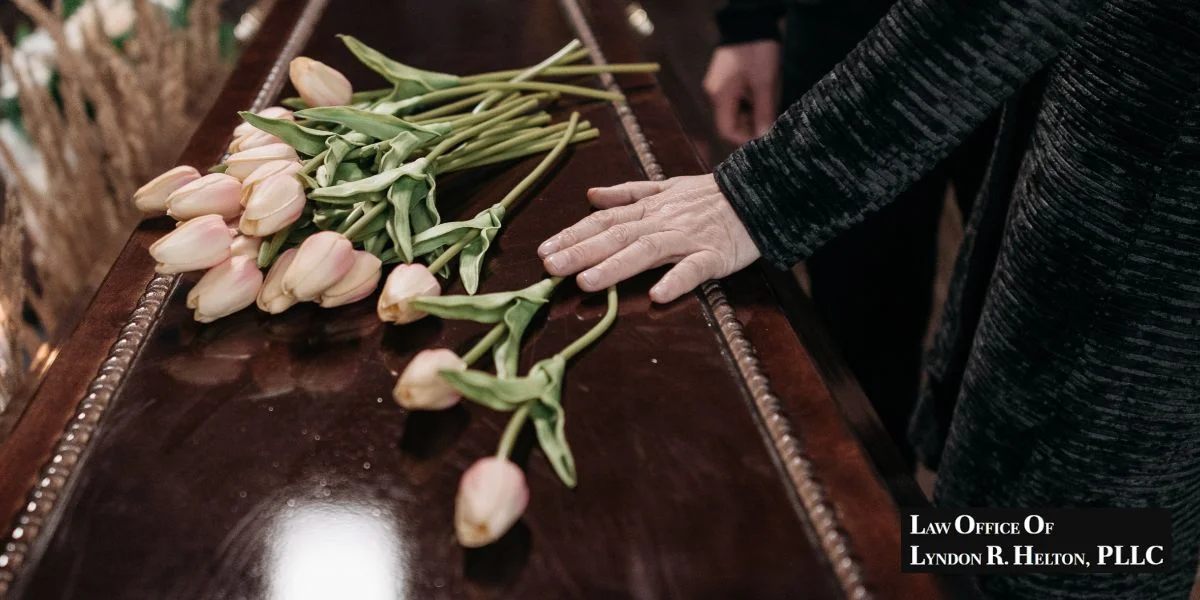Lincolnton Wrongful Death Lawyer
Lincolnton Wrongful Death Attorney
Experiencing the untimely death of a loved one due to the negligence or wrongdoing of another party is an unthinkable tragedy. When your family is faced with this immense loss, a Lincolnton wrongful death lawyer can serve as a crucial ally, helping you seek justice and compensation.
The Law Office of Lyndon R. Helton, PLLC, is proud to offer compassionate, end-to-end support throughout this difficult period, from initial help filing your wrongful death claim to negotiating an appropriate settlement or even litigating your case aggressively in a court of law if necessary.

Seek Justice in the Aftermath of Wrongful Death
There are many qualified attorneys and law firms in North Carolina who may be willing to take on a wrongful death case, but doing so effectively requires a particular mixture of sensitivity and legal prowess, one that not every personal injury lawyer in Lincolnton possesses. Our team at the Law Office of Lyndon R. Helton, PLLC, understands this balance and will equip you with powerful legal guidance while also having the utmost compassion and empathy for what you and your family are going through.
Here are some key reasons you will want to consider working with our highly reputable, local North Carolina law firm to resolve your wrongful death claim:
- Compassionate Yet Effective Support: We are aware of the emotional and mental toll of losing a loved one, and that’s why all of our legal services are designed with an eye toward compassion and humanity. We know that legal proceedings can be extremely formal and complex, but the attorney-client relationship is still an inherently human one at the end of the day, so we strive to truly be there for our clients throughout their greatest challenges.
- A Reputation for Results: Our founding attorney, Lyndon R. Helton, has been helping North Carolinians navigate the law for more than 20 years now, not just as a highly successful personal injury attorney but also as a prosecutor and public defender. No matter how unique or complicated your wrongful death claim might be, our team stands ready to meet it head-on with powerful, custom-tailored legal strategies.
- Personalized Legal Services: Every case is unique, especially when it comes to a matter as sensitive and high-stakes as a wrongful death lawsuit. We will take the time to hear your story, analyze all available evidence, and tailor a totally personalized legal strategy to fit your specific circumstances and goals.Our approach to the law is always informed by our client’s needs first and foremost. In wrongful death claims, this usually means implementing cost-effective strategies that aim to expedite proceedings and maximize compensation.
- Comprehensive, End-to-End Support: From evaluating your claim to helping you file your initial documents, to negotiating with insurance parties and defensive representation, and even litigating in court, if necessary, our commitment to your case begins as soon as you hire us and won’t end until your case has been resolved in a satisfactory way.
- Communication is Key: We strive to be highly available to our clients when they need us most, whether that means collaborating on a time-sensitive legal strategy or simply checking in to keep you up-to-date on proceedings. Our knowledgeable personal injury, wrongful death, and civil litigation legal team are only a call, text, or e-mail away when you need their help.
Understanding Wrongful Death Cases in North Carolina
Under North Carolina law, a death is considered “wrongful” (and therefore legally actionable in civil court) if it occurs:
- As the result of another party’s negligence, recklessness, or carelessness.
- As the result of another party’s intentional actions.
Note that in the second type of wrongful death (wherein another party’s deliberate actions led to the fatality), it’s likely that a simultaneous case for murder, manslaughter, or a similar charge would also be occurring. Please know that this is a separate matter with separate consequences, which must be handled by a criminal rather than a civil proceeding.
It’s also important to understand that many cases will be resolved out of court through negotiations or other alternative dispute resolution methods. Depending on the circumstances of the case, these negotiations will often involve an insurance carrier rather than being conducted with the defendant directly.
While it may seem counterintuitive to negotiate, rather than litigate, when trying to hold someone accountable and seek justice for a wrongful death, these out of court settlements are often a win-win proposition. Out of court settlements can keep the details of the case out of the public eye, reduce total court costs, and typically result in an expedited timeline for qualifying parties to receive their compensation.
At the Law Office of Lyndon R. Helton, PLLC, our primary focus is always on our client’s needs. This means we will explore every available avenue for resolving a wrongful death claim in a way that secures adequate compensation. When we can’t achieve this through collaborative negotiations, rest assured we are also prepared to go to court and litigate fiercely in an effort to uphold justice and honor your lost loved one’s legacy.
Types of Wrongful Death Claims
Remember that there is no “typical” wrongful death case. The correct strategy for any given case will depend on not just the claimant’s unique goals but also the details of the incident, which can vary immensely from case to case. Some of the different types of wrongful death claims we’re equipped to take on include:
- Catastrophic Injuries – In one way, a wrongful death claim can be seen as the most extreme form of personal injury lawsuit. When a person suffers serious injuries that lead directly to their demise, and these injuries were caused by the negligence or malfeasance of some other party, this may be grounds for a wrongful death claim.
- Industrial Accidents – If your loved one was killed in an industrial accident due to employer negligence or unsafe working conditions, we can help you navigate this sensitive intersection of civil and labor law. We will fight to hold the responsible parties accountable for their actions, even if those parties are well-funded corporations with dedicated in-house legal teams of their own.
- Automobile Accidents – Car crashes are a relatively common underlying cause of wrongful death claims. When someone’s negligent, reckless, or illegal driving is so out of hand that it causes the untimely death of another party, they, too, can be held accountable in a court of law.
- Medical Malpractice – If your loved one died due to inadequate medical attention, erroneous drug administration, or neglect or abuse occurring within a medical facility, you may be entitled to a substantial award for damages. Medical malpractice claims can represent some of the most complicated wrongful death proceedings but can also lead to some of the most substantial wrongful death settlements when handled by a competent wrongful death attorney.Well-insured medical systems are often quite eager to resolve these cases quickly and discreetly for public relations purposes, and the Law Office of Lyndon R. Helton, PLLC, knows how to use this to your advantage in negotiations.
- Premises Liability – Property owners, in many instances, have a legal responsibility to adequately maintain their estates so that their property is not hazardous to residents, lawful visitors, or passers-by. When a property owner fails to do this to such a severe extent that someone else is killed by their negligence, they may find themselves the subject of a wrongful death action.
- Product Liability – Wrongful death cases can also stem from defective or unsafe products. These situations can take a wide variety of forms, from unsafe foods or health supplements to defective automobile parts or poorly made electronics that present a fire hazard.
In North Carolina and several other states, the wrongful death suit must be brought by the personal representative of the decedent’s estate rather than directly by a family member. This personal representative is often named in someone’s will but can also be appointed by the court (often with significant input from the family) in cases where no valid will exists.
This does not mean that the personal representative will then receive all the proceeds from the wrongful death settlement, of course. While the decedent’s representative does customarily receive a percentage of the total settlement in exchange for their services, the majority of the proceeds will be granted to the decedent’s surviving spouse, children, grandchildren, parents, or siblings, typically in that order of priority.
FAQs
Q: What Constitutes Wrongful Death in NC?
A: Any fatality incurred by the negligence or deliberate wrongdoing of another party constitutes wrongful death in NC. Under state law, those seeking to bring a wrongful death claim must be prepared to prove that the defendant’s actions (or negligent inactions) led directly to the death in question. A qualified attorney can help you do this by gathering, analyzing, and presenting all the available evidence.
Q: How Do You Split a Wrongful Death Settlement in NC?
A: You split a wrongful death settlement in NC per the terms of the specific settlement in question or in accordance with a judge’s orders. Just like wrongful death cases themselves, each settlement will be a unique affair with its own circumstances and details. Settlement funds are typically awarded to surviving spouses, children, and parents, with other family members potentially eligible if no such kin exists.
Q: Is Wrongful Death the Same as Negligence?
A: Wrongful death is not the same as negligence, as each of these terms have distinct definitions, both in colloquial usage and strict legal context. While the terms are not synonymous or interchangeable, they are far from unrelated. Negligence is often an underlying cause of wrongful death. Many wrongful death cases hinge on a claimant’s ability to prove that someone else’s negligence led to the death in question.
Q: Can a Sibling Sue for Wrongful Death in NC?
A: A sibling cannot technically sue for wrongful death in Lincolnton, NC because such a lawsuit needs to be brought by a legally appointed personal representative of the deceased party, such as the executor named in their will. A sibling may be eligible to receive compensation in a wrongful death suit in some cases, but spouses, children, grandchildren, and parents will typically have priority over them.
The Law Office of Lyndon R. Helton, PLLC: Justice for Wrongful Death Victims
If your loved one has been taken too soon due to someone else’s negligent or malfeasant actions in Lincolnton or surrounding Burke, Caldwell, and Catawba counties, we can help you hold them accountable. While no amount of money can ever replace what you’ve lost, you may be able to pursue a substantial financial settlement that helps you cover your loved one’s final expenses and allows you to support your family throughout this challenging time.
To get started, please contact us at your convenience to set up a confidential and compassionate consultation.

